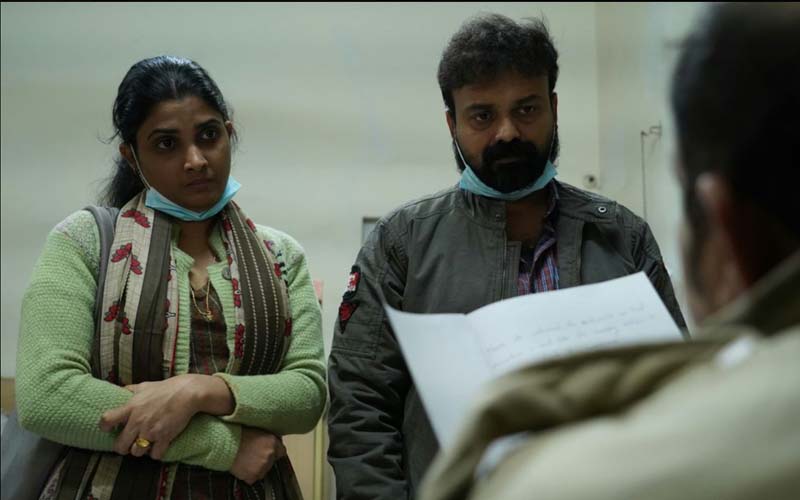Forged: Kunchacko Boban, Divya Prabha, Lovleen Misra, Danish Hussain, Faisal Malik, Kannan Arunachalam
Director: Mahesh Narayanan
Mahesh Narayanan continues to achieve fame as a filmmaker who tells tales about abnormal individuals in conditions of utmost misery. If Take Off (2017) chronicled the rescue of Indian nurses stranded in war-torn Iraq, C U Quickly (2020) handled the problem of human trafficking from a pc desktop. His new movie, Ariyippu (“Declaration”), premiering on the Locarno Movie Competition, revolves round a blue-collar couple that finds itself on the centre of a video clip scandal.
Kunchako Boban, who additionally co-produced the movie, performs Hareesh, a truck driver at a glove-making manufacturing facility within the state of Uttar Pradesh. He and his spouse Reshmi (Divya Prabha), a line employee on the identical manufacturing facility, are attempting to maneuver overseas and have spent appreciable sums of cash to acquire a visa. Their best-laid plans go awry when a video of Reshmi at work, spliced with a intercourse clip that includes a masked lady from the manufacturing facility, is leaked into the corporate chat group. Hareesh tries to tackle a corrupt police institution for justice, however his larger adversary appears to be residing inside.
In some ways, Ariyippu is a companion piece to C U Quickly, not the least in the way it dwells on the best way fashionable expertise mediates interpersonal transactions. The movie in actual fact begins with a vertical-format shot – a smartphone video of Reshmi testing gloves – that was the defining component of the earlier work. Like its predecessor, Ariyippu is within the precariat, the migrant employee class who bore the brunt of India’s first lockdown. Hareesh and Reshmi are, particularly, South Indian labourers eking out an existence within the far north, a seemingly odd reality identified by the sleazy cop dealing with their case.
The place the lockdown had impressed Mahesh Narayanan to make the perfect of his means in C U Quickly, the director appears to have had extra elbow house within the new movie, takes place because it does in populated factories and highways across the nationwide capital. Ariyippu compensates for this geographical scaling down with a keener sense of place, fog, sweaters and headlights evoking a exact picture of wintertime Delhi. The house that Hareesh and Reshmi reside in is roofed with the scribble of youngsters, possible youthful than their very own, maybe earlier tenants with goals not not like theirs.
In stark distinction to the digital ether that C U Quickly unfolds in, Ariyippu seems to take a particular pleasure within the physicality of issues. Repeated pictures of wood doorways closing and opening, actors slipping their masks up and down their mouths, and particulars equivalent to Hareesh’s cracked smartphone display screen add a coat of lived actuality to the story. The movie’s most interesting passages are, in actual fact, purely documentary; Ariyippu opens and closes with sequences showcasing the manufacture of medical gloves on an automatic line, a setting that one imagines impressed the venture within the first place.
Elevated freedom for an artist is just not, nevertheless, a essentially good factor, and Ariyuppu trades the razor-sharp narrative focus of C U Quickly for a fuzzier psychological portraiture. If the movie succeeds in surveying Hareesh’s fragile, self-flagellating male ego, it doesn’t appear to know what precisely to do with Reshmi, who’s now dodgy, now upstanding, now helpless. The movie seems to be caught between a want that makes us establish with Hareesh by eliding essential narrative info (and thus suspending the viewer in his doubt) and revealing all its playing cards to render Hareesh an object of research. The thematic thrust remembers Asghar Farhadi’s The Salesman (2018), however as a result of Ariyippu is reluctant to transcend its hard-set speculation, the corresponding emotional beats are missing.
Formally, Ariyuppu distinguishes itself from the epic styling of Malik (2021) and the experimental storytelling of C U Quickly, using a hard-edged life like aesthetic – handheld digicam, spare musical rating – that’s all too acquainted in worldwide impartial filmmaking. Alternatively, it does a exceptional job in dealing with doubtlessly sensational materials, which is essential for a piece expressly about consent. The viewers is just not handled to a wound inflicted on Reshmi’s face and her outrageous medical examination on the police station options simply the higher a part of her face in movement. Even within the movie’s most annoying scene of sexual violence, little or no is definitely made seen.
Boban will get a considerable, difficult function that he carries off with a convincing combination of intuition and evaluation. He performs Hareesh as a essentially respectable man compelled to confront his uglier aspect regardless of himself. He’s persuaded that the reply lies in violence, however isn’t positive what course this violence should take: generally it’s on the world, generally it’s at himself. Divya Prabha displays among the cautious gutsiness that Nimisha Sajayan dropped at Malik and her different movies. However the character, embodying the necessity to keep vertical in a world prepared to bend, lacks the nuance that might have lent her eventual transition extra conviction. The second ethical dilemma woven round her – additionally turning across the notions of purity and an infection – registers as weakly built-in into the plot, as is the half-hearted social commentary. And no, Fahadh Faasil is just not on this image.


